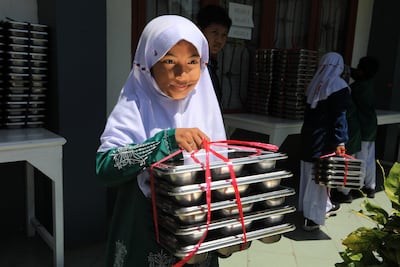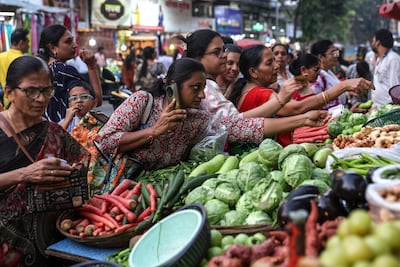The UN’s World Social Report 2025 has painted a damning picture – rising poverty, widening inequality and escalating climate shocks that are undoing decades of social progress. More than 3.8 billion people still lack basic social support systems.
Social protection policies and programmes are particularly sparse in low-income countries, where the need is greatest. Those left out, often women and children, are likely to also be the most nutritionally vulnerable.
As leaders gather in Doha this week for the Second World Summit for Social Development, one question should frame the discussion: “How can social protection systems not only protect, but empower people to break the cycle of poverty and malnutrition, across every stage of life?”
Nutrition and social protection are mutually reinforcing. When people have access to nutritious food, health and productivity improve. When these systems fail, inequality deepens.
Well designed and resourced, social protection systems can facilitate access to complementary support and services to address direct, underlying and root causes of malnutrition, especially during the crucial first 1,000 days of a child’s life.
Social protection can be used to strengthen safety nets, for example with the provision of food or cash transfers that enable vulnerable populations to access a nutritious diet. Nutrition-sensitive cash transfers help reduce reliance on cheap, unhealthy foods and establish healthy habits early in life.
Most of the 67 countries of the Sun Movement (79 per cent) have highlighted the integration of nutrition across sectors as a way to maximise efficiency and impact. However, in many countries policies and budgets are siloed, even when people’s lives are not. While nutrition is often integrated into health systems in Sun countries, less than half consistently integrate it into social protection, highlighting a significant missed opportunity.
One good example of a country that is successfully bringing nutrition and social protection together is The Gambia where a “cash plus care” model led by the National Nutrition Agency combines cash transfers with nutrition and health education.
It is vital to weave nutrition goals into safety nets and emergency responses
Despite being newly launched, integration across social welfare, education and health has already had a measurable impact – 98 per cent of participating households now afford more varied and nutritious meals; while 54 per cent of families have started small businesses, 58 per cent of them led by women. By linking income support with knowledge and empowerment, the model transforms temporary relief into long-term resilience, helping women feed their families, educate their children and build independent futures.
School feeding programmes are also powerful social investments – they reduce the financial burden on low-income families and keep children in school. They can also create co-benefits across local economies. In Rwanda, a school meals programme sources food from local farmers, improving educational outcomes, while also boosting the farmers’ incomes. Every healthy meal served in these schools is a down payment on a child’s future, and in this project the investments are playing double duty for the local community and economy.
However even the best-designed systems can be thrown off course. Across low and middle-income countries, recurring shocks – conflict, inflation, extreme weather and displacement – disrupt access to food, health and livelihoods. These crises affect people at every stage of life.
When crises hit, social protection that can quickly respond makes the difference between recovery and setback. That is why it is vital to weave nutrition goals into safety nets and emergency responses.
For example, cash transfers combined with nutrition and health services can expand during crises to help families keep access to healthy food and essential care. Connecting these systems to climate adaptation plans also strengthens resilience and reduces the need for constant emergency aid.
But while the need is universal, the means are not. Low-income and fragile countries face constraints such as limited fiscal headroom, poor access to financing and insufficient technical capacity to design and manage adaptive systems.
Bringing nutrition into broader systems like social protection can unlock more diverse and sustainable financing by tapping into existing national and global funding streams. With nutrition still receiving less than 1 per cent of total Official Development Assistance, integration is not just smart – it’s essential. The Sun Movement supports countries to strengthen this integration and to secure the financing needed to make nutrition gains sustainable over time.
If governments, donors and development banks make nutrition integration the norm we can transform social protection into social empowerment, building resilient societies that thrive through every challenge. Social progress begins with nourishment. It’s time to make nutrition everyone’s business.
Race 3
Produced: Salman Khan Films and Tips Films
Director: Remo D’Souza
Cast: Salman Khan, Anil Kapoor, Jacqueline Fernandez, Bobby Deol, Daisy Shah, Saqib Salem
Rating: 2.5 stars
Tamkeen's offering
- Option 1: 70% in year 1, 50% in year 2, 30% in year 3
- Option 2: 50% across three years
- Option 3: 30% across five years
MEDIEVIL%20(1998)
%3Cp%3E%3Cstrong%3EDeveloper%3A%3C%2Fstrong%3E%20SCE%20Studio%20Cambridge%3Cbr%3E%3Cstrong%3EPublisher%3A%3C%2Fstrong%3E%20Sony%20Computer%20Entertainment%3Cbr%3E%3Cstrong%3EConsole%3A%3C%2Fstrong%3E%20PlayStation%2C%20PlayStation%204%20and%205%3Cbr%3E%3Cstrong%3ERating%3A%3C%2Fstrong%3E%203.5%2F5%3C%2Fp%3E%0A
Babumoshai Bandookbaaz
Director: Kushan Nandy
Starring: Nawazuddin Siddiqui, Bidita Bag, Jatin Goswami
Three stars
WORLD RECORD FEES FOR GOALKEEPERS
1) Kepa Arrizabalaga, Athletic Bilbao to Chelsea (£72m)
2) Alisson, Roma to Liverpool (£67m)
3) Ederson, Benfica to Manchester City (£35m)
4) Gianluigi Buffon, Parma to Juventus (£33m)
5) Angelo Peruzzi, Inter Milan to Lazio (£15.7m
White hydrogen: Naturally occurring hydrogen
Chromite: Hard, metallic mineral containing iron oxide and chromium oxide
Ultramafic rocks: Dark-coloured rocks rich in magnesium or iron with very low silica content
Ophiolite: A section of the earth’s crust, which is oceanic in nature that has since been uplifted and exposed on land
Olivine: A commonly occurring magnesium iron silicate mineral that derives its name for its olive-green yellow-green colour
The Brutalist
Director: Brady Corbet
Stars: Adrien Brody, Felicity Jones, Guy Pearce, Joe Alwyn
Rating: 3.5/5
Spider-Man: No Way Home
Director: Jon Watts
Stars: Tom Holland, Zendaya, Jacob Batalon
Rating:*****
Match info
Uefa Champions League Group C
Liverpool v Napoli, midnight
Film: Raid
Dir: Rajkumar Gupta
Starring: Ajay Devgn, Ileana D'cruz and Saurabh Shukla
Verdict: Three stars
Global state-owned investor ranking by size
|
1.
|
United States
|
|
2.
|
China
|
|
3.
|
UAE
|
|
4.
|
Japan
|
|
5
|
Norway
|
|
6.
|
Canada
|
|
7.
|
Singapore
|
|
8.
|
Australia
|
|
9.
|
Saudi Arabia
|
|
10.
|
South Korea
|
Email sent to Uber team from chief executive Dara Khosrowshahi
From: Dara
To: Team@
Date: March 25, 2019 at 11:45pm PT
Subj: Accelerating in the Middle East
Five years ago, Uber launched in the Middle East. It was the start of an incredible journey, with millions of riders and drivers finding new ways to move and work in a dynamic region that’s become so important to Uber. Now Pakistan is one of our fastest-growing markets in the world, women are driving with Uber across Saudi Arabia, and we chose Cairo to launch our first Uber Bus product late last year.
Today we are taking the next step in this journey—well, it’s more like a leap, and a big one: in a few minutes, we’ll announce that we’ve agreed to acquire Careem. Importantly, we intend to operate Careem independently, under the leadership of co-founder and current CEO Mudassir Sheikha. I’ve gotten to know both co-founders, Mudassir and Magnus Olsson, and what they have built is truly extraordinary. They are first-class entrepreneurs who share our platform vision and, like us, have launched a wide range of products—from digital payments to food delivery—to serve consumers.
I expect many of you will ask how we arrived at this structure, meaning allowing Careem to maintain an independent brand and operate separately. After careful consideration, we decided that this framework has the advantage of letting us build new products and try new ideas across not one, but two, strong brands, with strong operators within each. Over time, by integrating parts of our networks, we can operate more efficiently, achieve even lower wait times, expand new products like high-capacity vehicles and payments, and quicken the already remarkable pace of innovation in the region.
This acquisition is subject to regulatory approval in various countries, which we don’t expect before Q1 2020. Until then, nothing changes. And since both companies will continue to largely operate separately after the acquisition, very little will change in either teams’ day-to-day operations post-close. Today’s news is a testament to the incredible business our team has worked so hard to build.
It’s a great day for the Middle East, for the region’s thriving tech sector, for Careem, and for Uber.
Uber on,
Dara
Red flags
- Promises of high, fixed or 'guaranteed' returns.
- Unregulated structured products or complex investments often used to bypass traditional safeguards.
- Lack of clear information, vague language, no access to audited financials.
- Overseas companies targeting investors in other jurisdictions - this can make legal recovery difficult.
- Hard-selling tactics - creating urgency, offering 'exclusive' deals.
Courtesy: Carol Glynn, founder of Conscious Finance Coaching
Specs
Engine: Duel electric motors
Power: 659hp
Torque: 1075Nm
On sale: Available for pre-order now
Price: On request
The Sand Castle
Director: Matty Brown
Stars: Nadine Labaki, Ziad Bakri, Zain Al Rafeea, Riman Al Rafeea
Rating: 2.5/5



